Choosing the right motor oil is key for your vehicle. 10w 40 engine oil is a top pick. It offers great protection, efficiency, and cleanliness for your engine. Its full-synthetic ester/PAO formula makes it a great choice for smooth engine performance.
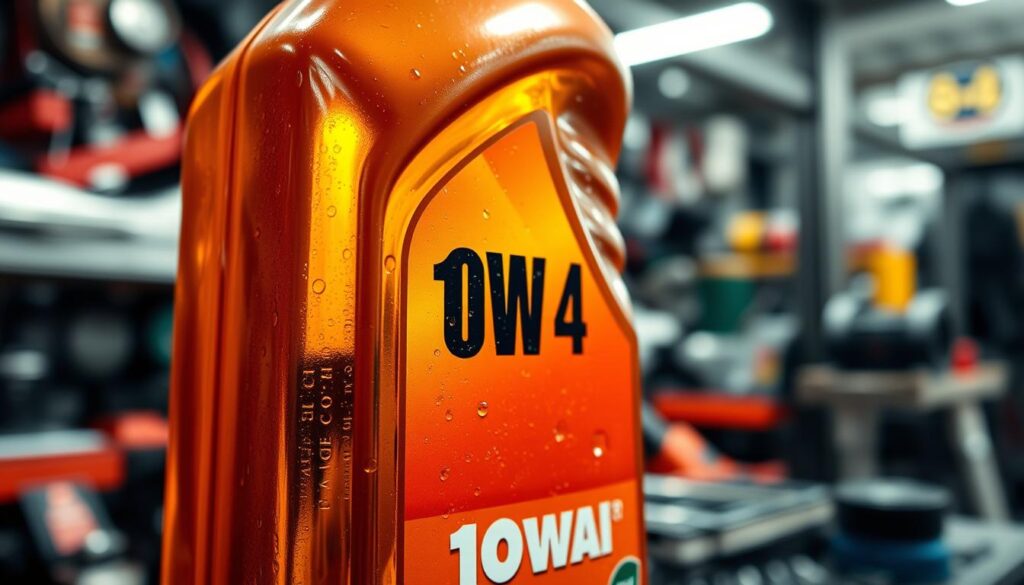
Using the right motor oil, like 10w 40, boosts your vehicle’s performance. It improves fuel efficiency, cuts emissions, and extends engine life. This article will dive into 10w 40 engine oil’s benefits and how it enhances engine performance.
Key Takeaways
- 10w 40 engine oil is a full-synthetic ester/PAO formula designed to provide superior protection and efficiency
- It can help to improve engine performance and fuel efficiency
- 10w 40 engine oil is suitable for a wide range of vehicles and driving conditions
- It can help to extend the life of your engine and reduce maintenance costs
- Choosing the right type of motor oil, such as 10w 40 engine oil, is critical for your vehicle’s performance and longevity
Understanding 10w 40 Engine Oil Basics
Knowing about oil viscosity is key for engine protection. Viscosity is how easily oil flows, changing with temperature. The “10W” in 10w 40 engine oil means it’s good in cold, while “40” is for hot temperatures.
This special oil works well in both cold and hot, making it a favorite. Its viscosity index (VI) shows how much it changes with temperature. A higher VI means less change and better protection.
What the Numbers Mean
The numbers in 10w 40 engine oil tell us about its viscosity at different temperatures. “10W” means it’s 10 centistokes (cSt) at 0°C (32°F). “40” means it’s 40 cSt at 100°C (212°F). This lets it flow well in cold and stay lubricating in hot.
Viscosity Explained
Viscosity is vital for motor oil, as it affects lubrication and engine protection. Thicker oils are more resistant to flow, while thinner ones are less so. The right viscosity depends on temperature and conditions, making multi-grade oils like 10w 40 popular.

Multi-grade Oil Technology
Multi-grade oil technology lets oils like 10w 40 adapt to different temperatures. It uses additives and base oils for optimal performance. Understanding viscosity and multi-grade oils helps owners choose the best oil for their engine.
| Viscosity Rating | Temperature | Description |
|---|---|---|
| 10W | 0°C (32°F) | Low-temperature viscosity |
| 40 | 100°C (212°F) | High-temperature viscosity |
Benefits of Using 10w 40 Oil in Your Vehicle
Using 10w 40 oil in your vehicle can improve engine performance and fuel efficiency. It offers great lubrication over a wide temperature range. This reduces engine wear and tear.
As a result, you can save money on fuel and lower vehicle maintenance costs.
Some key benefits of using 10w 40 oil include:
- Improved engine protection and reduced friction
- Enhanced fuel economy and reduced fuel consumption
- Increased engine life and reduced maintenance costs
Also, 10w 40 oil works well in both gasoline and diesel engines. Its excellent lubrication properties help reduce engine stress and wear. This leads to a longer engine life and lower maintenance costs.

Overall, using 10w 40 oil in your vehicle can greatly impact its engine performance, fuel efficiency, and vehicle maintenance needs. By choosing the right oil, you can extend your vehicle’s life and save on maintenance costs.
| Oil Type | Viscosity | Temperature Range |
|---|---|---|
| 10w 40 | 10W-40 | -20°C to 40°C |
When to Choose 10w 40 Over Other Oil Grades
Choosing the right oil for your car depends on several things. This includes the climate and how old your car is. In places with very cold or hot weather, 10w 40 oil is great for your engine. It’s also good for cars with over 75,000 miles because it fights engine wear and deposits well.
The climate where you live is key in picking the right oil. In cold places, a thinner oil like 5w 30 works better. But in hot places, a thicker oil like 15w 40 is better. The age of your car also matters. Older cars need thicker oil to protect the engine.
When picking an oil grade, consider a few things:
- Viscosity: Thicker oils are better in hot weather, while thinner oils are better in cold.
- Climate: Extreme temperatures need oil that can handle them.
- Vehicle age: Older cars need thicker oil to prevent engine wear.

In short, picking the right oil depends on several factors. These include the climate, how old your car is, and the oil’s viscosity. By thinking about these, you can pick the best oil for your car. This will help your engine run its best.
| Oil Grade | Viscosity | Climate | Vehicle Age |
|---|---|---|---|
| 5w 30 | Thinner | Cold | Newer |
| 10w 40 | Medium | Extreme | Older |
| 15w 40 | Thicker | Hot | Any |
Common Applications for 10w 40 Engine Oil
10w 40 engine oil is great for many vehicle maintenance needs. It works well in cars, trucks, sports cars, and even boats. Its lubricating power protects engines.
It’s often used in light trucks and diesel engines. Even smaller motorcycle engines benefit from it. The oil’s thickness is good for older engines and doesn’t leak easily.

Using 10w 40 engine oil has many advantages. It reduces engine wear, saves fuel, and is good for the environment. Many car makers suggest it, thanks to its performance in different weather.
Here are some common uses for 10w 40 engine oil:
- Passenger cars
- Light trucks
- Performance vehicles
- Marine applications
- Diesel engines
- Motorcycle engines
Synthetic vs Conventional 10w 40 Oil Options
Choosing the right oil for your car is important. You can pick between synthetic oil and conventional oil. Synthetic oilworks better in extreme temperatures. Conventional oil is cheaper but not as good in extreme weather.
Synthetic oil protects your engine better, even when it’s under a lot of stress. Conventional oil is good for daily driving but not as strong in extreme temperatures. It’s a reliable choice for everyday use.
Cost Comparison
Synthetic oil costs more than conventional oil. But, it lasts longer, which can make it more cost-effective over time. Here’s a look at the prices:
| Type of Oil | Cost per Quart | Change Interval |
|---|---|---|
| Synthetic Oil | $10-$15 | 10,000-15,000 miles |
| Conventional Oil | $5-$10 | 5,000-7,500 miles |
Whether to choose synthetic or conventional oil depends on what you need. If you want the best performance and are okay with a higher price, synthetic oil is for you. If you’re looking for a budget-friendly option for daily driving, conventional oil is a good choice.
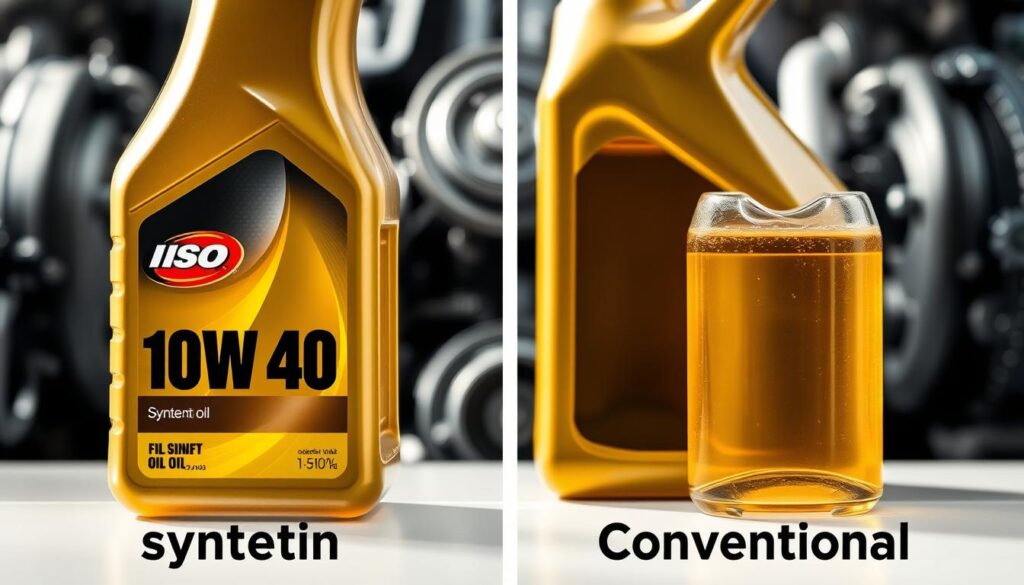
How Temperature Affects 10w 40 Oil Performance
Temperature is key in how well 10w 40 engine oil works. Its viscosity and lubrication change with temperature. This affects its ability to protect the engine.
In cold, 10w 40 oil gets thicker, protecting more at high temperatures. But in heat, it stays lubricated, keeping the engine smooth.
The temperature effects on 10w 40 oil are important. They help decide if it’s right for different climates and uses. For example, in cold places, 5w 30 oil is better for starting. But 10w 40 is better for hot places or tough activities like off-roading.
When looking at oil performance in different temperatures, consider these points:
- Viscosity ratings: 10w 40 oil is thicker than 5w 30, better at high temperatures.
- Engine age: Older engines might need thicker oil like 10w 40 for protection.
- Operating conditions: 10w 40 is great for extreme conditions like dusty or muddy terrains.
Choosing the right oil depends on many things. These include the climate, engine age, and how you use your vehicle. By understanding how temperature affects 10w 40 oil, you can protect your engine and get the best performance.
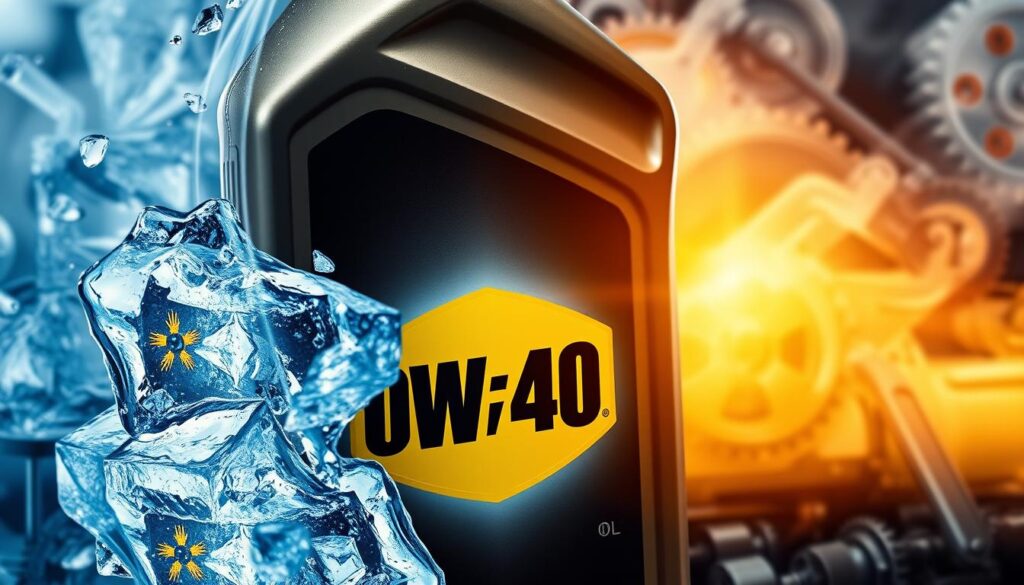
| Oil Type | Viscosity | Suitable Temperature Range |
|---|---|---|
| 5w 30 | Thinner | Colder climates |
| 10w 40 | Thicker | Hotter climates or demanding activities |
Best Practices for Oil Changes with 10w 40
Regular oil changes keep your vehicle’s engine healthy and running well. The time between changes depends on your car and how you drive. Most say to change oil every 5,000 to 7,500 miles.
Doing DIY maintenance like oil changes is easy at home. But, it’s key to follow the car maker’s guide and be safe. This prevents engine damage and keeps you safe.
Here are some tips for oil changes:
- Use the correct type and amount of oil for your vehicle
- Dispose of used oil and filters responsibly
- Check and replace the oil filter as needed
- Keep track of your oil change history to stay on schedule
By following these tips and keeping up with oil changes, you can make your engine last longer. This keeps your car running smoothly for many years.

| Oil Type | Change Interval | Recommended Use |
|---|---|---|
| 10w 40 | 5,000 to 7,500 miles | Most passenger vehicles |
| Synthetic 10w 40 | 7,500 to 10,000 miles | High-performance vehicles or extreme driving conditions |
Signs Your Engine Needs an Oil Change
Regular engine maintenance is key for your vehicle health. It’s important to watch for oil change signs. These signs tell you when your engine needs oil, even if it’s not time yet.
Look out for signs like lower fuel efficiency, odd noises, and oil leaks. If you see these, act fast to avoid engine damage.
Here are some key things to check:
- Oil level: Check your oil level at least once a month to ensure it’s at the recommended level.
- Oil color: Clean engine oil is typically brown and transparent. If it’s dark or dirty, it may be a sign that your oil needs to be changed.
- Engine performance: If your engine is running rough or making strange noises, it could be a sign that your oil needs to be changed.
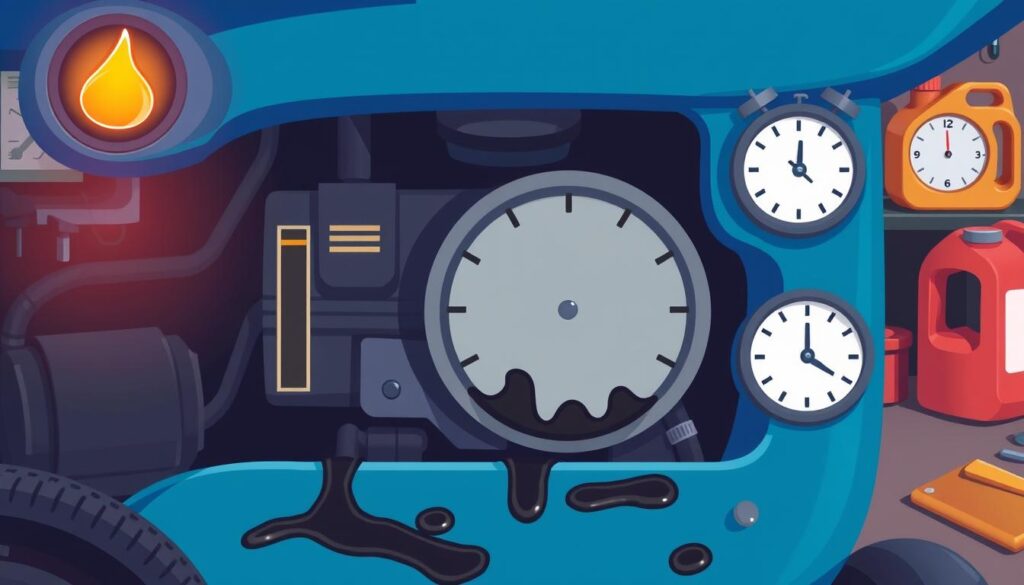
By watching for these signs and doing regular engine maintenance, you can make your engine last longer. Always check your owner’s manual for oil change signs and maintenance tips for your vehicle.
| Oil Type | Viscosity | Temperature Range |
|---|---|---|
| 10W-40 | 10W-40 | -17.8 C to 100 C |
Top Brands of 10w 40 Engine Oil
Choosing the right 10w 40 engine oil is important for your vehicle. There are many brands to pick from, both premium and budget-friendly. It’s key to find a high-quality oil that fits your car’s needs.
Castrol, Shell, and Mobil are among the top brands for 10w 40 engine oil. Castrol’s GTX 10W-40 oil is a favorite for many. It fights engine sludge from short trips, contaminants, and heat. Shell’s Helix HX7 works well with different fuels like petrol, diesel, and biodiesel.
Premium Options
TotalEnergies’ Quartz 10W-40 is a premium choice with fully synthetic oil. It’s good for many car makers, including Volkswagen, Renault, and Mercedes. Liqui Moly’s Super Leichtlauf is also a top pick, made for high mileage engines and costs about $61.84.
Budget-Friendly Choices
If you’re looking to save money, there are affordable options. Mobil’s semi-synthetic 10W-40 oil is a good deal for cars with over 75,000 miles. Castrol’s Magnatec also offers protection against wear and tear in stop-start systems.
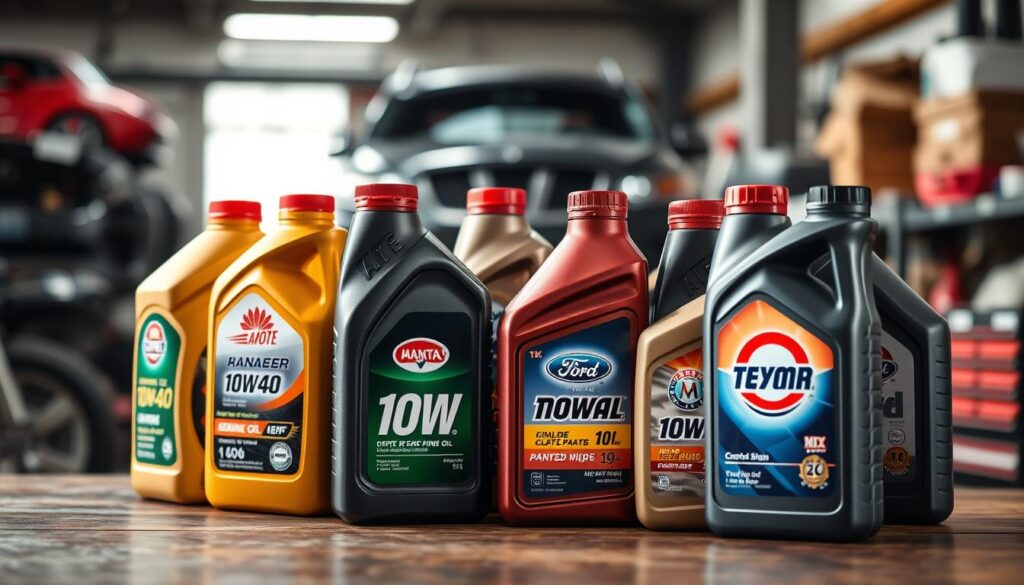
Finding the best oil for your car depends on your needs and budget. Look into both premium and budget-friendly brands. This way, you can choose the best oil for your vehicle.
Environmental Impact of 10w 40 Oil
The use of 10w 40 engine oil has a big environmental impact. This can be lessened with the right oil disposal and choosing eco-friendly options. Synthetic oils, for instance, cut down on emissions and make exhaust gases cleaner. This makes them a greener choice.
Some key benefits of synthetic oils include:
- Reduced emissions and cleaner exhaust gases
- Longer drain intervals, resulting in less waste oil
- Less polluting production process compared to semi-synthetic oils
Also, oils like 0W-30 and 5W-30 can improve fuel economy and lower friction. This reduces the environmental impact. By picking the right oil and disposing of it properly, car owners can lessen their environmental impact. This helps make the future more sustainable.

It’s key to think about the environmental impact of 10w 40 oil. We should look for eco-friendly options to cut down waste and harm to the environment. By making smart choices and adopting green practices, we can help make the world cleaner and healthier for the next generations.
| Oil Type | Environmental Impact | Eco-Friendly Options |
|---|---|---|
| Synthetic Oil | Reduced emissions and cleaner exhaust gases | Longer drain intervals and less waste oil |
| Semi-Synthetic Oil | Less polluting production process | Lower cost and wider availability |
Common Myths About 10w 40 Motor Oil
There are many oil myths and misconceptions about 10w 40 motor oil. One myth is that it’s only for high-performance vehicles. But, scientific facts prove it’s good for many vehicles, not just fast ones.
Some myths say synthetic oil harms seals and doesn’t mix well with petroleum oil. But, synthetic oil doesn’t hurt seals. It’s the additives that matter, not the oil type. Knowing the truth about engine oil is key.
Here are some important facts:
- Synthetic motor oils do not damage seals; compatibility is influenced by the additive mix, not the oil type.
- Engine oil consumption is reduced in mechanically sound engines using synthetics due to lower volatility and better sealing between piston rings and cylinder walls.
- Synthetic motor oils are significantly more sludge resistant than petroleum oils due to higher flash points and resistance to evaporation loss and oxidation.
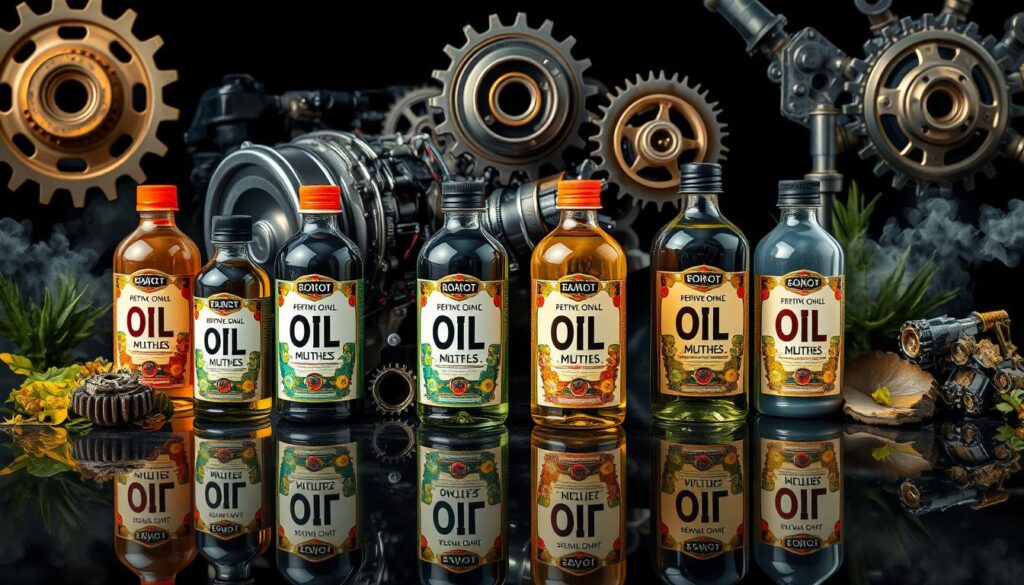
By knowing the scientific facts about 10w 40 motor oil, you can choose the best oil for your car. Always check your car’s manual. Think about the climate, car age, and performance when picking oil.
| Oil Type | Viscosity | Temperature Range |
|---|---|---|
| Synthetic 10w 40 | 10w 40 | -25°C to 100°C |
| Petroleum 10w 40 | 10w 40 | -25°C to 100°C |
Mixing Different Oil Grades with 10w 40
When mixing oil, it’s key to check if different grades work well together for engine safety. Mixing 10w 40 oil with other types is possible, but knowing how it affects your engine is important. For example, mixing 5w 30 and 10w 40 oils is okay, with some makers saying it’s fine to use up to 1 liter of 5w 30 in 10w 40.
Viscosity is a big deal when mixing oils. Different viscosities can cause too little lubrication, leading to more friction and wear on engine parts. But, some research shows that small differences, like mixing 5w 30 with 10w 30, might not hurt right away. Yet, it could affect oil performance in extreme conditions over time.

To keep your engine safe, always follow the maker’s oil change and viscosity advice. Regular oil changes and checking oil levels can stop engine wear. In short, mixing different oil grades with 10w 40 is okay, but think about how it might affect your engine’s performance and safety.
| Oil Grade | Viscosity | Compatibility |
|---|---|---|
| 5w 30 | Lower viscosity | Generally compatible with 10w 40 |
| 10w 30 | Similar viscosity to 5w 30 at high temperatures | Compatible with 10w 40 |
| 10w 40 | Higher viscosity | Compatible with conventional and synthetic motor oils |
Storage and Handling Guidelines
Proper oil storage and handling are key to keeping 10w 40 engine oil quality high. It’s important to store oil in a cool, dry spot. This keeps it away from sunlight and heat.
When handling oil, cleanliness is key. Use clean tools and avoid mixing it with other substances. The oil’s shelf life also matters, as it impacts its performance and safety.
Proper Storage Conditions
For 10w 40 engine oil to stay safe and effective, store it in a well-ventilated area. Keep it away from harmful substances. The storage space should be clean and dry, with no moisture.
By following these guidelines, you ensure your oil stays in top condition. This keeps your vehicle running smoothly and safely.

Shelf Life Information
The shelf life of 10w 40 engine oil is generally long. But, it can change based on storage and handling. Always check the expiration date and follow the manufacturer’s advice.
By doing this, you help keep your engine in great shape. This ensures your vehicle runs well and efficiently.
Troubleshooting Common Oil-Related Issues
Identifying the cause of oil-related issues is key to avoiding engine damage. Troubleshooting problems like oil leaks, low fuel efficiency, and engine issues is vital. This helps fix problems early on.
Common engine problems include overheating, low oil pressure, and engine knocking. To solve these, check the oil level and viscosity. Also, look for leaks. A diagnostic tool can help pinpoint the issue.
Here are some tips for troubleshooting common oil-related issues:
- Regularly check the oil level to ensure it’s correct.
- Use the right oil viscosity for your vehicle to avoid engine issues.
- Watch for oil leaks, like stains or drips under the engine.
- Use a diagnostic tool to find the problem’s source.
By following these tips and being proactive about oil-related issues, you can prevent engine problems. Always check your vehicle’s manual for specific guidance on troubleshooting and maintenance.
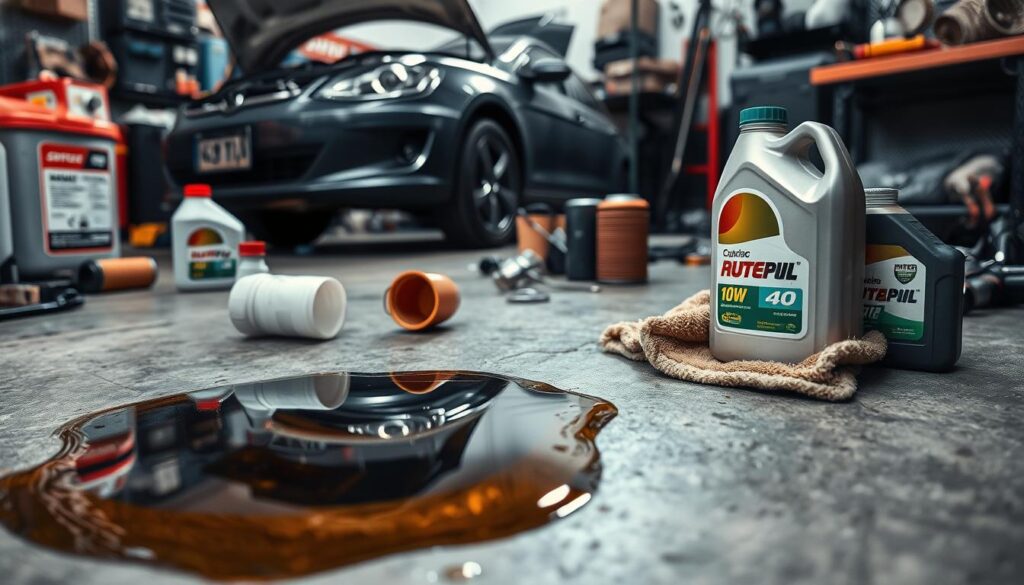
| Oil-Related Issue | Symptoms | Solution |
|---|---|---|
| Oil Leak | Stains or drips under the engine | Check and replace the oil filter or gasket |
| Decreased Fuel Efficiency | Lower mileage per gallon | Check and replace the air filter, and ensure proper tire pressure |
| Engine Problems | Overheating, low oil pressure, engine knocking | Check the oil level, oil viscosity, and look for signs of leakage |
Conclusion: Making the Right Choice for Your Engine
Choosing the right oil for your car is key. It matters whether your car is new or old, and where you drive it. The right 10w 40 oil can keep your engine running well for a long time.
10w 40 oil helps your engine run smoothly and efficiently. It protects against wear and tear. Think about what your car needs, like the climate and its age, when picking oil.
Look into different 10w 40 oils from trusted brands. Check their performance, cost, and how long they last. The right oil choice can make your car run better and last longer.
FAQ
What do the numbers in 10w 40 engine oil mean?
The numbers in 10w 40 engine oil show its viscosity. “10w” is for cold weather, and “40” is for hot weather. This oil works well in both cold and hot temperatures.
What are the benefits of using 10w 40 engine oil in my vehicle?
10w 40 engine oil boosts engine performance and protects it from wear. It also improves fuel efficiency. Its formula ensures smooth engine operation.
When should I choose 10w 40 engine oil over other oil grades?
Choose 10w 40 oil based on your climate, vehicle age, and the manufacturer’s advice. It’s great for extreme temperatures.
What are the common applications for 10w 40 engine oil?
10w 40 oil is good for many vehicles, like cars, trucks, and marine engines. It’s versatile and provides excellent lubrication.
How does temperature affect the performance of 10w 40 engine oil?
10w 40 oil keeps its viscosity and lubrication in all temperatures. It protects the engine well in different conditions.
What are the top brands of 10w 40 engine oil, and how do they compare?
Many brands offer 10w 40 oil, from premium to budget-friendly. Look at performance, cost, and vehicle compatibilitywhen choosing.
What are some common myths about 10w 40 engine oil?
There are many myths about 10w 40 oil. We’ll look at the facts to help you choose wisely.
Can I mix different oil grades with 10w 40 engine oil?
Mixing oil grades is not usually recommended. It can harm your engine’s safety and performance. We’ll discuss the risks and benefits.
How should I store and handle 10w 40 engine oil?
Proper storage and handling are key for 10w 40 oil’s effectiveness and safety. We’ll give tips to keep it in top condition.
What are some common oil-related issues, and how can I troubleshoot them?
We’ll cover common engine problems related to oil. We’ll offer solutions and tips to keep your vehicle running smoothly.